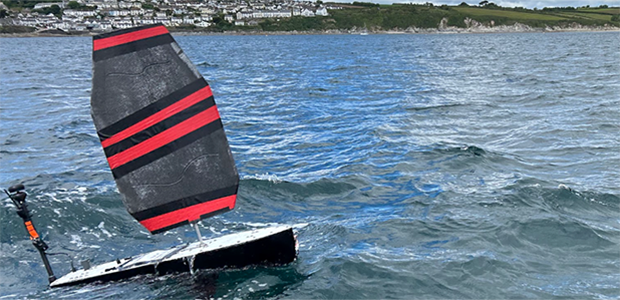
Wayve founder invests in robotic sailboat pioneer
Oshen, a British company pioneering the use of small, wind-powered, self-sailing boats to capture unique maritime, weather, and ecological data, has secured funding from Dhyan Ventures, Amar Shar’s technology investment vehicle.
Co-founder of Wayve AI, the autonomous mobility company and one of the UK’s few robotics ‘unicorns’, Shar is one of four angel investors supporting the technology startup as it transitions from research and development to servicing paying customers.
Oshen’s boats – known as ‘Ocean Bees’ – act like seaborne satellites, using autonomous navigation software, developed in-house, to hold station and provide persistent intelligence on sea states and temperature, weather patterns, and marine ecosystems. The 1m long, 25kg vessels are fully autonomous and can be deployed individually or as part of an ocean-wide fleet.
Shah said: “As we move into an AI dominant world, machine learning models and hardware are becoming commodities. Conversely, novel and accurate data acquisition will be an attractive place for startups to build competitive business moats, especially if in arenas where 'big tech' do not venture. Oshen's vision is essentially this for ocean and weather data."
Ocean Bees are constructed from everyday materials and utilise off-the-shelf components. This keeps costs low and reliability high, opening up opportunities for a wider range of users. Onboard sensors and systems are powered by robust solar cells, rather than batteries, making long-term monitoring missions possible. Bees are also easy to launch and retrieve.
This is in contrast with the autonomous sailing vessels (ASVs) currently being used for tasks such as coastal bathymetry or hurricane research. Typically bespoke constructions, they are far larger than Oshen’s technology, with far higher energy consumption. This means they can stay on task for only limited periods and need the support of specialist back-up teams and equipment.
This is also true for traditional maritime data-gathering technologies, which can be prohibitively costly: data-buoys cost upwards of £300,000 each per year while daily charter prices for manned research vessel can easily exceed £10,000 per day – one reason why environmental surveys for UK offshore wind developments are expected to cost c. £150 million between now and 2030.
Oshen Co-founder Anahita Laverack said: “We want to do for the sea what smallsats did for space: revolutionise access by providing a reliable, low-cost platform anyone can use – from scientific researchers to clean energy providers to weather forecasters. Currently, the price of doing research at sea is prohibitive – which is why biodiversity surveys are brief and infrequent, and offshore weather data patchy. Our Ocean Bees can monitor specific sites or wide areas for weeks, months or even years, for a fraction of the cost, capturing unique long-term data. The recent news about record-breaking ocean temperatures shows just how important this sort of insight is.”
The angel investment will help Oshen accelerate its journey to market and tap into a ‘blue economy’ predicted to double in value to $3 trillion by 2030. The firm opened a new headquarters in Plymouth earlier this year, bringing product development, operations, and sales under one roof. As well as working on science projects – the team are currently conducting its second biodiversity study in the Irish Sea for DEFRA – Oshen is developing its commercial proposition and is in negotiations with commercial energy and weather data providers, in the UK and US.


